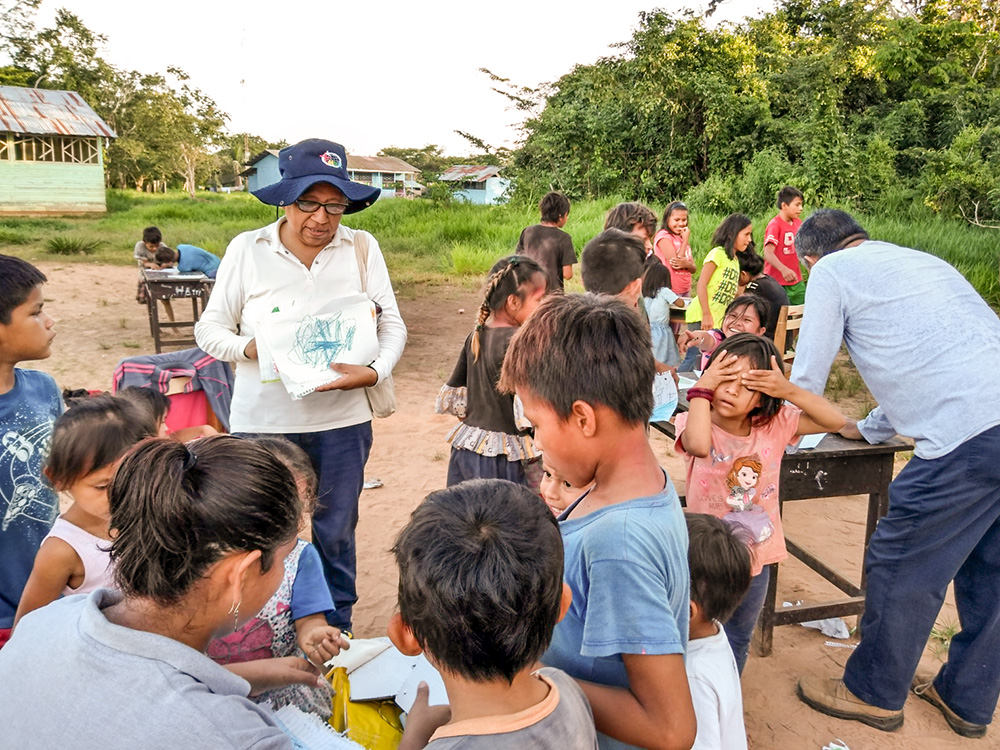
Dominican Sr. Zully Rojas Quispe takes part in an activity for children during one of her visits to the Indigenous communities of the Peruvian Amazon. (Courtesy of Zully Rojas Quispe)
To listen with urgency and humility to the cries of the Amazon and its Indigenous people was what Sr. Zully Rojas Quispe asked the church during her speech at the Vatican's synod for the Amazon region in October 2019.
"Listening with humility to the voice of the Amazon's poor people, [which is] an expression of the voice of God, commits us to their cry," Rojas Quispe said during her address to the bishops. "We have to be close to [the Indigenous people] to defend their life, their land and their culture."
Rojas Quispe is the current provincial of the Dominican Missionaries of the Rosary in Peru. Throughout her religious life, she has carried out different administrative and pastoral ministries that have allowed her to know firsthand the worldview of the Amazonian Indigenous peoples Ese Ejas and Harakbuts, who live in the Peruvian Amazon.
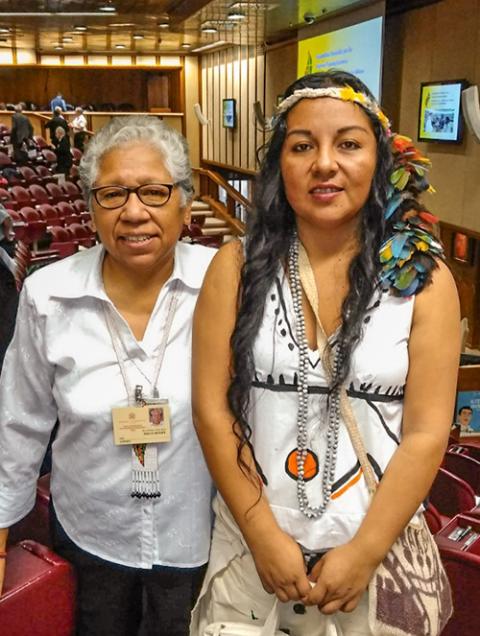
Dominican Sr. Zully Rojas Quispe and Yessica Patiachi, member of the Harakbut culture and one of the vice presidents of the Pan-Amazonian Ecclesial Network (REPAM), pose for a photo during the synod for the Amazon, held in Rome in October 2019. (Courtesy of Zully Rojas Quispe)
"In 2018, I arrived as a missionary in the Apostolic Vicariate of Puerto Maldonado," Rojas Quispe told Global Sisters Report. "Accompanying the Indigenous people and listening to their dreams has been a reaffirmation of my vocation."
Due to her expertise in accompanying social leaders and Indigenous ministries, the Latin American Confederation of Religious (CLAR) appointed her as an auditor for the 2019 synod for the Amazon.
"At the synod, I recalled to the church that this land is wounded," Rojas Quispe said. "We have to make the world aware that [the Amazon's] forests are being killed and rivers polluted in the name of an economic system that devastates everything in its way."
According to Rojas Quispe, the Indigenous people's lives, territory and culture are constantly in danger due to illegal mining, excessive use of mercury, and deforestation, which are consequences of extractivism in the region.
"There is a clear state absence in these situations," Rojas Quispe said. "Concessions continue to be granted to the powerful without consulting the Indigenous people. It is a mockery for our people."
Rojas Quispe's missionary vocation arose more than 25 years ago when she encountered the Dominican Missionaries of the Rosary in the ceja de selva or jungle gateway — one of the highest and most lushly vegetated regions in the Andes.
Advertisement
"I was working as a pharmaceutical chemist in Quillabamba when I met the sisters working in the hospital as nurses, obstetricians and evangelizers," Rojas Quispe said. "I became a missionary to serve others with joy."
"The Amazon is, for me, a question of identity because we Dominican Missionaries of the Rosary were founded in that land more than 100 years ago. So we came out of the Amazon to do missions around the world."
_____
GSR: What is the current social situation in the Peruvian Amazon?
Rojas Quispe: The Amazonian Indigenous peoples constantly find their lives at risk. They know that their lives and culture are in danger when others come to destroy their forests, jungles and rivers, both in Peru and neighboring countries.
Indigenous people continue to be discriminated against, excluded by societies and ignored by the state. They have also been called second-class citizens. They do not have what is rightfully theirs, such as quality education, resources to care for their health or prior consultation on their lands.
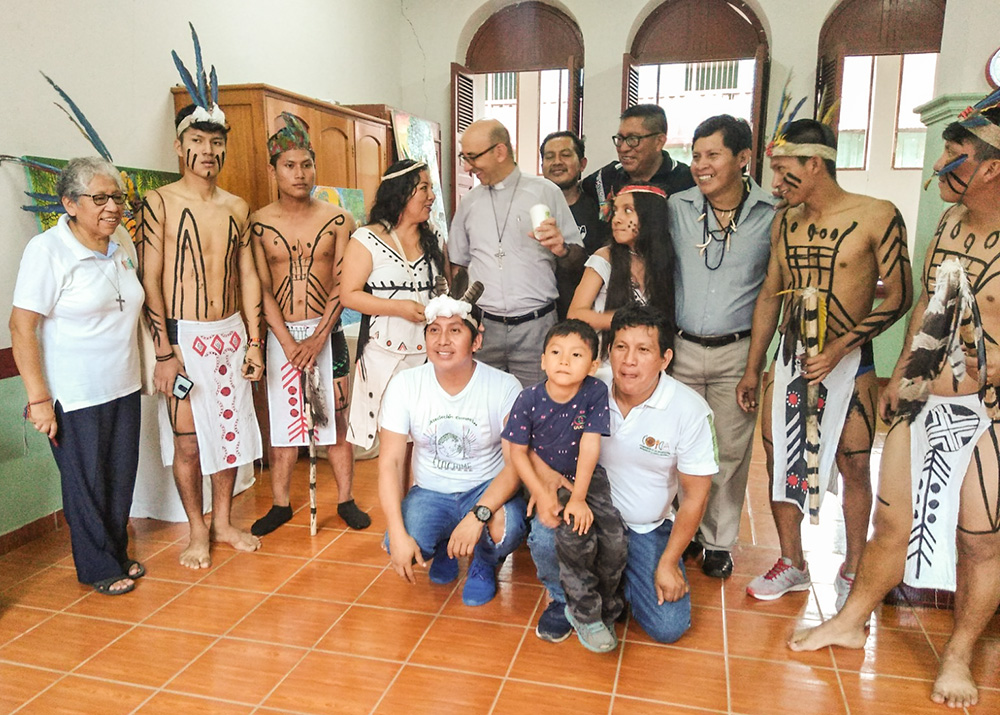
Dominican Sr. Zully Rojas Quispe, left, with some participants of the first art exhibition of the Etochime Harakbut group in Puerto Maldonado, Peru, in December 2020 (Courtesy of Zully Rojas Quispe)
The Peruvian government turns its back on the Amazonian people. It rejected the Escazú Agreement, which protects the lives of environmental defenders, and approved laws to favor indiscriminate logging.
These shortcomings are bringing other consequences to the Indigenous communities, such as forced migration, or people rejecting their own culture and language.
What is the main problem facing the Indigenous people?
They say they are "losing their botica" [apothecary]. That means that their land is being devastated and their rivers polluted. Their quality of life is restricted because others are getting rich by trampling on their rights. This causes them to lose harmony with the nature that feeds and keeps them healthy.
An example could be illegal mining: It is the greatest crime that can exist! To extract gold, they pollute everything in their way. Those who work there are treated completely inhumanely. They work in the mud, with mercury and very long hours.
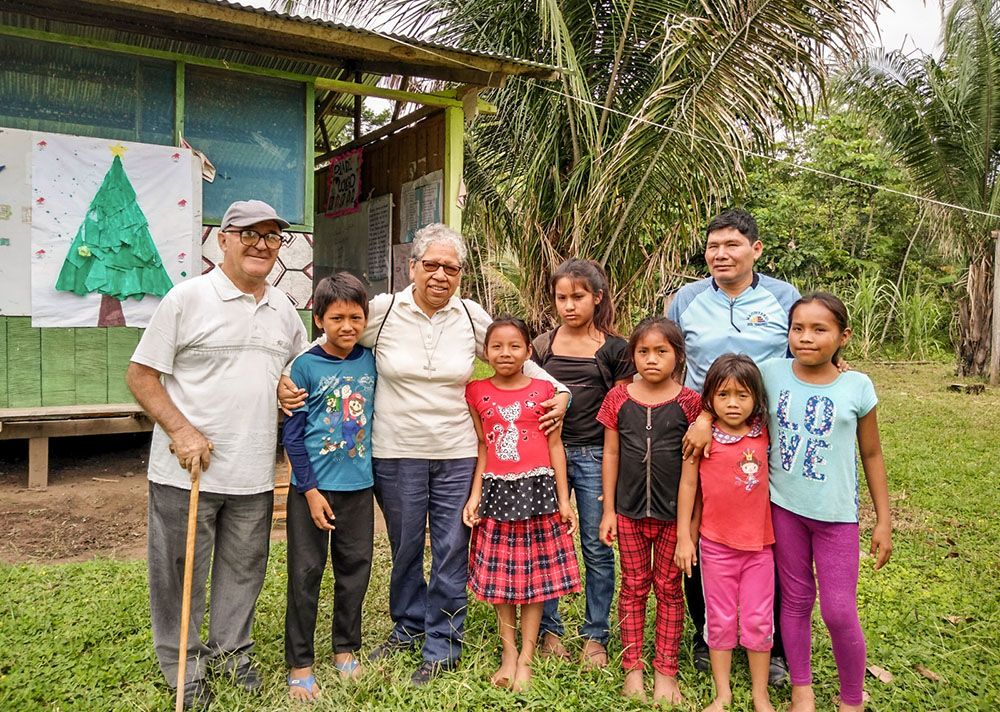
Sr. Zully Rojas Quispe and Dominican Fr. Macario López visit the community of San Martin de Tipishca, Peru, in 2019. (Courtesy of Zully Rojas Quispe)
To obtain the gold, they contaminate the environment and the relationships between people. Corrompen la armonía de los pueblos indígenas. [They corrupt the harmony of the Indigenous peoples.] Under these conditions, it is not surprising that there is more and more human trafficking and prostitution.
Although these people have clearly been ignored and exploited, we should not idealize Indigenous people either. In reality, many are accommodating [their lives to the situation]. For example, some prefer to work in these conditions because in one week they make more money than a teacher would earn in a month.
How was your experience working in the Indigenous ministry for the Peruvian Amazon region?
In the Amazon, we must know how to listen and accompany. We also have to unlearn what we already know to learn the dynamics of Indigenous cultures. We have to learn how to serve these people from their worldview and context, which is why intercultural dialogue is so important. For me, this is a constant learning process.
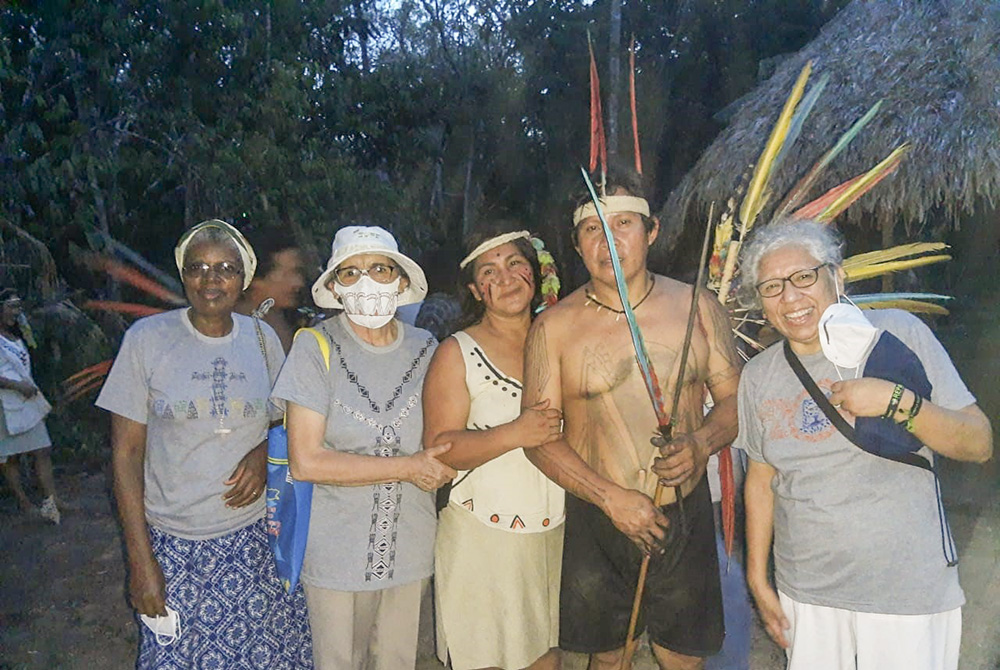
Sr. Zully Rojas Quispe, right, together with other Catholic sisters and two Indigenous people belonging to the Harakbut culture during one of the initiation rites of the ethnic group (Courtesy of Zully Rojas Quispe)
Let us remember that evangelization requires inculturation and interculturality. That is why I insist on knowing how to listen with humility. If we manage to understand this, we will strengthen what our Indigenous brothers and sisters have already been working on: having their own voice to advocate for their communitarian and personal rights.
When you get people's trust, they give themselves completely. Sometimes, it is so hard: I believe that to be a missionary in the Amazon, you must have a vocation.
After the synod, what should the church in this region be like?
The synod's final document and Pope Francis' remark that we should be a church that is Samaritan, that is a servant and that "goes forth." However, this requires time and training. We have to leave aside clericalism and strengthen the small steps we are taking. This is the way to configure us as a church with an "Amazonian face."
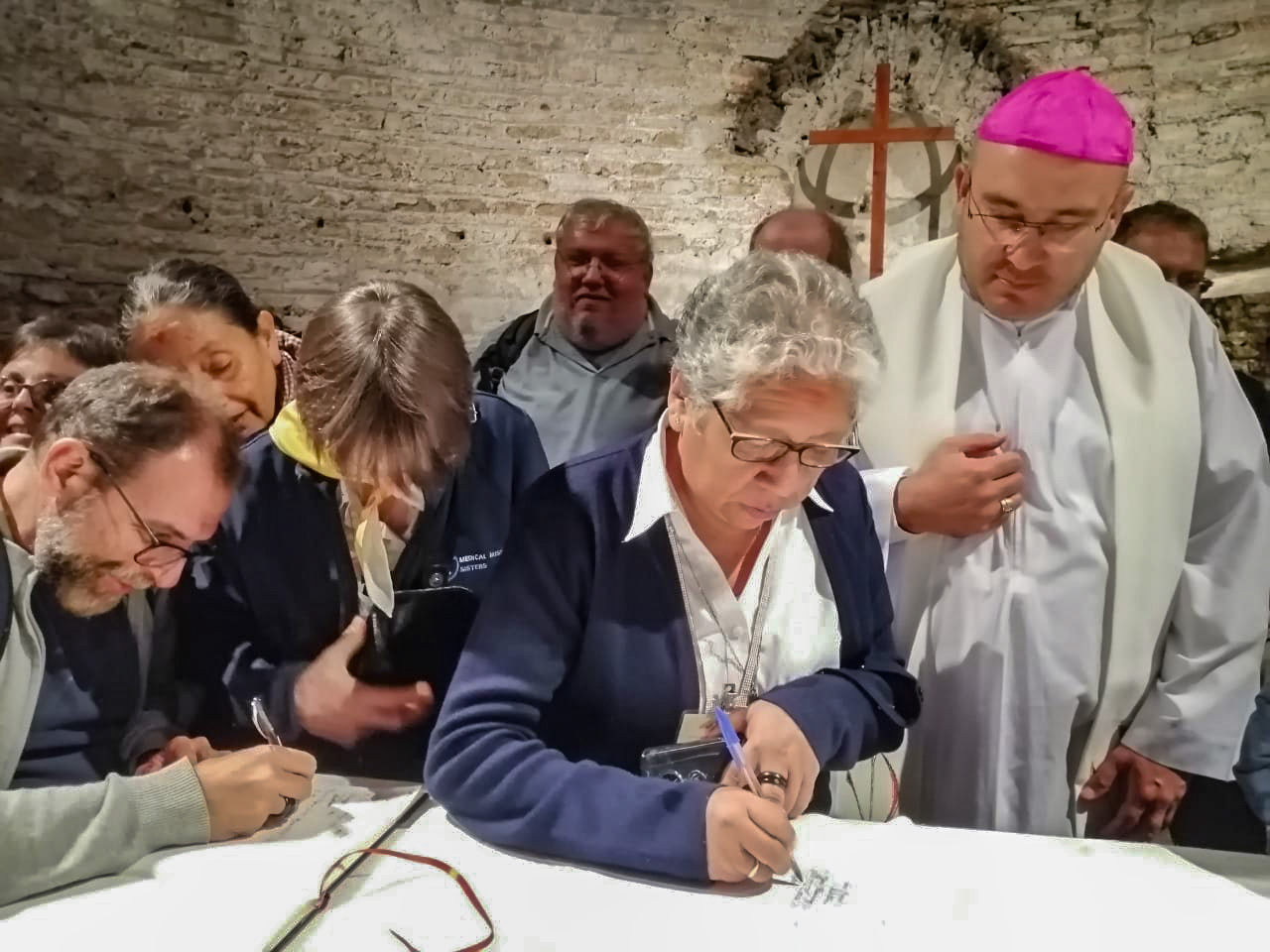
Dominican Sr. Zully Rojas Quispe at the Catacombs of Domitilla in Rome, signs the "Pact of the Catacombs for the Common Home" along with some of the participants of the synod for the Amazon held in October 2019. (Courtesy of Zully Rojas Quispe)
We need to listen and avoid believing that we already know everything. We need to learn how the Indigenous live, cry, whisper, sing and praise.
The synod has been a kairos for this region ... and for humanity. We have to discover the voice of God in creation! That is something the lay faithful here are well aware of. The mission is to make us walk together in the church. The pope told the Indigenous people that now it is the time for them to speak for themselves.
In the Indigenous communities, women are the guardians of the seeds. In other words, they are the ones who ensure the future of the families. We, as a church, need to follow that example of care.




